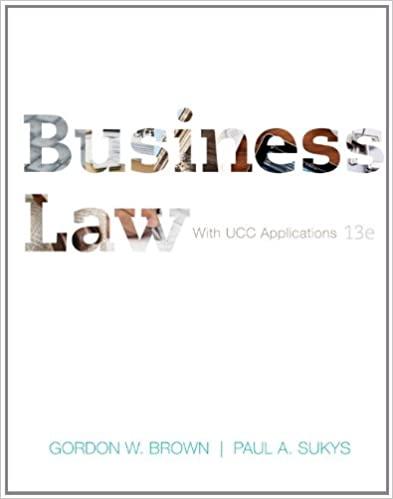Corporations are interesting legal constructs. They are totally artificial; they do not have any type of corporal
Question:
Corporations are interesting legal constructs. They are totally artificial; they do not have any type of corporal existence. There is no way to see a corporation, talk to one, or watch one in action. Even when we speak of Lehman purchasing Ibex Capital Markets and transforming it into Hudson Castle, for example, we know that Lehman did no such thing. Lehman cannot act. Lehman has no existential existence.
Similarly, when we talk about BP’s liability in the disaster in the Gulf, we know that there really is no BP to arrest, arraign, indict, and hold without bail. Yet, we not only continue to speak of Lehman and BP as if they were made of flesh and blood, but we also provide them with constitutional rights and give them state citizenship. We also grant them something that the flesh and blood citizens among us do not have—perpetual existence.
Corporations outlive their founders, their officers, their directors, their employees, and their shareholders, well, at least their human shareholders. Perpetual existence, however, does not mean eternal existence. Corporations can and do “pass away.” Most actually pass away rather quickly, largely because their incorporators, officers, and directors have mismanaged their resources, mishandled their corporate agenda, or mistreated their employees. At least that is the judgment offered by John Steele Gordon, a financial historian, who in an article entitled “How Long Is a Corporate Lifespan?” also notes that, occasionally, a goliath appears on the corporate horizon whose life seems to be eternal. Still, Gordon argues that all corporate entities, even the goliaths among them, have a life cycle. “They are born,” he writes, and they “mature, age, and die.” To prove his point he discusses the long, ambitious, and highly successful life of the great railroads, which dominated the transportation industry in the 19 th century and far into the 20 th only to die from the most common ailment that eventually attacks all the goliaths, “they become,” he says, “fat, dumb, lazy, and uninnovative .” The American automobile industry is the latest of the goliaths to enter a stage of rapid decline and the next group on the list may be the great investment banks like Lehman Brothers, and all the Lehman clones who are also on the verge of becoming “fat, dumb, lazy, and uninnovative .”
Question
1. Is perpetual existence a good idea from a legal and financial perspective or should we limit the life span of corporations? Explain.
2. According to Gordon, all corporations, even the great goliaths like GM and Chrysler, “become fat, lazy, dumb, and uninnovative .” Is he correct in this judgment? Why or why not?
3. Take another look at the Opening Case at the beginning of this chapter. In that case, Lehman tries to hide some of its financial activities by passing them off to Hudson, thus avoiding what is called “headline risk.” Is manipulating corporate ownership to avoid headline risk an ethical practice? Why or why not?
4. Does Lehman exercise too much control over Hudson, or is Hudson really independent? Explain.
5. Is there any justifiable reason for granting corporations citizenship and constitutional rights? Why or why not?
Step by Step Answer:

Business Law With UCC Applications
ISBN: 9780073524955
13th Edition
Authors: Gordon Brown, Paul Sukys





